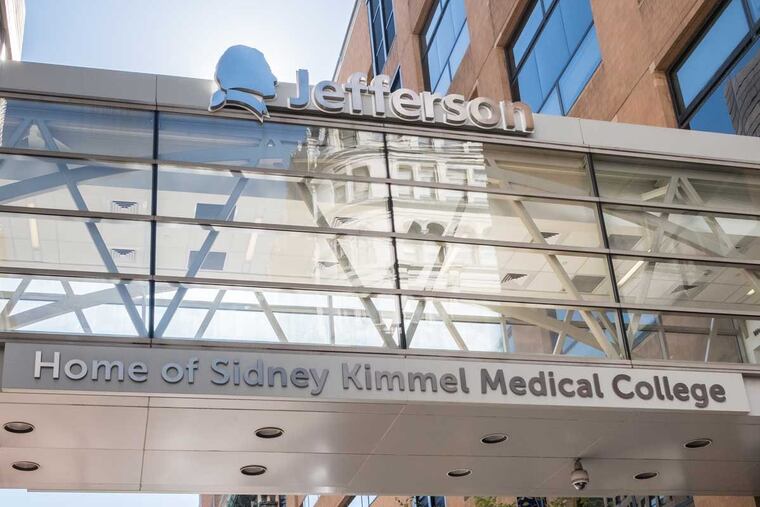Thomas Jefferson University’s financial outlook upgraded from negative to stable by Moody’s
The upgrade was a positive for the system, which had a nearly $300 million operating loss in fiscal 2020, despite $325 million in government COVID-19 aid.

Moody’s upgraded Thomas Jefferson University’s financial outlook from negative to stable in an assessment that emphasizes the size that Jefferson has achieved through acquisitions since 2015 under chief executive Stephen K. Klasko.
Jefferson’s “rapid clinical and academic expansion over a short period will further secure its leading market position and essentiality in a competitive region with influential payers,” Moody’s said Friday. Although the financial outlook was upgraded, the nonprofit maintained its strong A2 rating from Moody’s.
Jefferson expanded extraordinarily quickly from 2015 through 2017 with the acquisition of three health systems, forming an organization with more than $5 billion in revenue but declining profit margins. Then came the coronavirus pandemic, which contributed to a nearly $300 million operating loss at Jefferson — despite the receipt of $325 million in government aid.
Thomas Jefferson University includes an academic arm and a health-care arm, known as Jefferson Health. The two sides have joint financial statements, unlike at the University of Pennsylvania and Temple University, where the health systems are owned by the universities but have separate financial statements.
Although Moody’s views Jefferson’s size as an advantage, its attempt to get even bigger through the acquisition of Einstein Healthcare Network drew an antitrust lawsuit from the Federal Trade Commission. The FTC alleged that Jefferson has gained too much power in the marketplace and would be able to unfairly raise prices if it owned Einstein.
U.S. District Judge Gerald J. Pappert has not yet issued his ruling in the case.
Even without Einstein, Moody’s said, Jefferson accounted for 19% of hospital discharges in 2018 in a nine-county area that covers Bucks, Chester, Delaware, Montgomery, and Philadelphia Counties in Pennsylvania and Burlington, Camden, Gloucester, and Salem Counties in New Jersey. “Penn Medicine and Main Line Health are the next largest competitors,” Moody’s said.
» READ MORE: Jefferson to eliminate 500 positions and trim top executives’ pay as losses mount from COVID-19
Overall, Penn had more hospital admissions in the year ended June 30, 2020, than Jefferson, reporting 129,016 admissions compared with 124,872 for Jefferson, but two of Penn’s hospitals, Lancaster General and Princeton Medical Center, are outside Jefferson’s primary service area.
An offset to inpatient clout is the decades-long shift of care from hospitals to outpatient settings. In fiscal 2020, Penn doctors performed 64,908 ambulatory surgeries, compared with 39,379 at Jefferson, according to reports to investors. It’s not clear how many of Penn’s procedures were outside Jefferson’s nine-county region. Penn has 11 multi-specialty outpatient sites. Jefferson said it owns two ambulatory surgery centers and has eight others that are joint ventures.
Outpatient care also includes infusions, catheterizations, and many different kinds of imaging.
Moody’s praised the outpatient pavilion Jefferson plans to build at 11th and Chestnut Streets in Center City, saying it will “improve clinical care and patient experience and reduce lease costs.” The report said Jefferson would likely start borrowing in mid-2022 to pay for the 19-story building, which is expected to open in 2024.
» READ MORE: Jefferson says it will take several years to return to pre-COVID-19 profit levels
Jefferson, which told investors last month that is was starting “a multi-year effort” to return the system to pre-COVID levels of profitability, said it was pleased that its rating was affirmed and its outlook upgraded.
“Due to our financial stewardship and growth over the past seven years, our strong balance sheet, and in particular, our cash position,” Jefferson said in an email, “we remain very stable and this will enable Jefferson to meet all current and future obligations, including future investment in our mission to improve lives.”
“We continue to work aggressively to recover revenue lost to COVID-19 while caring for the needs of our community and keeping our faculty, staff, students, and patients safe,” Jefferson said.